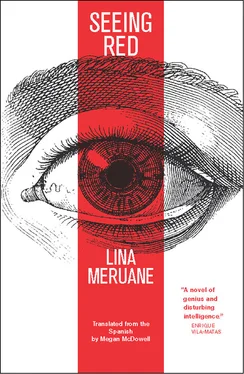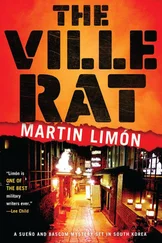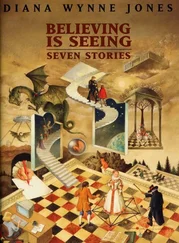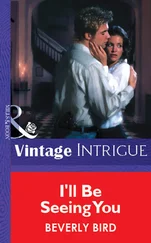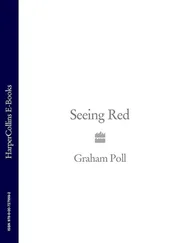Lina Meruane - Seeing Red
Здесь есть возможность читать онлайн «Lina Meruane - Seeing Red» весь текст электронной книги совершенно бесплатно (целиком полную версию без сокращений). В некоторых случаях можно слушать аудио, скачать через торрент в формате fb2 и присутствует краткое содержание. Год выпуска: 2016, Издательство: Deep Vellum Publishing, Жанр: Современная проза, на английском языке. Описание произведения, (предисловие) а так же отзывы посетителей доступны на портале библиотеки ЛибКат.
- Название:Seeing Red
- Автор:
- Издательство:Deep Vellum Publishing
- Жанр:
- Год:2016
- ISBN:нет данных
- Рейтинг книги:3 / 5. Голосов: 1
-
Избранное:Добавить в избранное
- Отзывы:
-
Ваша оценка:
- 60
- 1
- 2
- 3
- 4
- 5
Seeing Red: краткое содержание, описание и аннотация
Предлагаем к чтению аннотацию, описание, краткое содержание или предисловие (зависит от того, что написал сам автор книги «Seeing Red»). Если вы не нашли необходимую информацию о книге — напишите в комментариях, мы постараемся отыскать её.
This powerful, profound autobiographical novel describes a young Chilean writer recently relocated to New York for doctoral work who suffers a stroke, leaving her blind and increasingly dependent on those closest to her. Fiction and autobiography intertwine in an intense, visceral, and caustic novel about the relation between the body, illness, science, and human relationships.
Lina Meruane
Seeing Red — читать онлайн бесплатно полную книгу (весь текст) целиком
Ниже представлен текст книги, разбитый по страницам. Система сохранения места последней прочитанной страницы, позволяет с удобством читать онлайн бесплатно книгу «Seeing Red», без необходимости каждый раз заново искать на чём Вы остановились. Поставьте закладку, и сможете в любой момент перейти на страницу, на которой закончили чтение.
Интервал:
Закладка:
claw
Count the next morning, too. Count instead of dropping pebbles that would guide my way back, or breadcrumbs that the birds would have eaten if I were crossing an enchanted forest and not walking down an airplane aisle. So I walked and counted seats, in search of the bathroom. Twenty-four. Everything under control, I told myself, balancing on the chemical toilet. On my way back the turbulence started, and my hand became a claw clutching awkwardly at the air, trying to grab hold of a backrest but landing, instead, on something warm, soft, meaty. My owl-fingers with their badly trimmed nails had come to rest on a shoulder. Or a breast. Or was it an ear? A sleeping body that I was shaking awake. I’m sorry, I stuttered, not really knowing where to direct my apology, I’m sorry, trying in vain or more like pretending I was trying to retract the claw from the mouth that opened suddenly to complain. What is this idiot doing? I heard a voice say, waking other people up. Trying not to fall over, I slid my hand up over a forehead of rough and impatient folds, and there my hand stayed, seizing up as we hit violent turbulence. Realizing the precarious balance I found myself in, my torso leaning forward, the woman took a firm hold of my hand, pulled it finger by finger from her face, and forced it back to where it belonged. That’s your seat, she groused, as if I didn’t understand anything, as if I were mentally challenged or worse, to her: a gringa . Take one step back, she said, and maybe talking to her companion she murmured, if she’d take those glasses off, maybe she could see something. That accent, so unmistakably Chilean, harbored the glacial poem of the mountain peaks and their snows in eternal mid-thaw, the dark whisper of the south dotted with giant rhubarbs, the mourning of roadside shrines, the herb-garden smell, the rough salts of the desert, the sulfurous copper shell of the mine open to the sky. The entire nation embodied in the bitter, uncertain tone of that traveler who suddenly, as I lifted my glasses, understood. Blind? There was no need to explain to her I wasn’t entirely blind, that I could distinguish contrasts. That I knew the flight attendant had opened a window and it encased me in its rectangle of light, and that someone else had closed it again, that the light beams of a movie were shining intermittently. I was a blind woman capable of detecting flashes of light, and, from afar, also the compassion of others that came after surprise. Blind? That compassion made me crawl with hate. Blind! she said again. Sit down, please, repeated the woman, but I couldn’t move. That pity of hers had paralyzed me. It had me stuck there while my memory traveled quickly into the past. The woman must have thought I didn’t understand, and as if I were a dog trained in British English, she raised her voice and said sit, miss, you’re going to fall, sit! Shit, I thought, but instead of cursing her I chewed a short sí and another s í, ya le oí, I heard you, ma’am, and I even understood. I speak the same Spanish as you. I turned around and sat down diligently, turning on my walkman to listen to a book, any book, and I buckled my seat belt and tightened it to the point of asphyxiation.
connections
Sunk once again in another wheelchair, I wanted to be a ghost stealthily returning to settle old scores, to cross through the world without feeling it instead of bumping awkwardly into it all. But as it was, rolling through the tube of the airport, the specter I hoped to be realized, overwhelmed and amazed, that I had materialized again. I’d been recognized. Someone was bawling the Lucina that the calendar of saints records only as an etymological error, like Lucila or Lucita or Lucía, or even Luz, which is so close to Luzbel, the demon of light. Under the hallucinogenic effects of anesthesia, my mother — who until then had professed nothing beyond the doctrines of pediatrics — thought she heard the child I was starting to be babble a name. Lucina! my mother called out when she heard me cry between her legs, and in ecstasy she repeated it to be sure. Lucina. The delirium was getting to me too, since that was the very word I thought I was hearing there in the passageway. Lucina. It grew in decibels. Lucina! Anticipating the body that emitted it like a lightning bolt that comes seconds ahead of the thunder. It was following me at full speed. Lucina? it said, doubting, ever closer, with an inquisitive nasal inflection, opening its way through the people. I heard panting breath and then a spasmodic what…? happened to you…? And without waiting for the answer I didn’t plan to give, the same thing again, more formally this time: what happened to you, Lucina? still agitated from the run. Why are you in a wheelchair? Did you break your leg? I would have liked to leap with all my wheels and handles into the future, or jump into the past as off a cliff; but no, I take it back, I thought ipso facto, not into the past. The bearer of that voice could only come from a preterite tense to which I didn’t want to return. There was no escape. The employee in charge of pushing me stopped so the excruciating interrogation could continue. I pricked up my ears but could not place the voice anywhere in the fog of my adolescence. Without asking, so as not to give myself away, I followed what he was saying in search of clues. He almost hadn’t recognized me in those black glasses. They look straight out of DINA, he said, and then corrected himself. Are you going incognito? More like blind alter ego, I said to myself, praying he would leave. And as if sensing the impatience that was growing weedlike inside me, he corrected himself again. But they look great on you, are they from New York? From China, I murmured to myself, made in China or Taiwan or someplace in India. Imported direct from the street. (You gave them to me, Ignacio, and now you’re wearing a pair just like them.) We were silent. The employee got the chair moving again but my interrogator refused to give up on the scene of our failed reencounter. He followed, filling the pauses, saying aloud that New York was a fan-tas-tic city, that the things happening there were in-cre-di-ble, ab-so-lute-ly crazy, how could people so immeasurably rich live on the same island with the kind of beggars you didn’t even see in Chile anymore? He’d gotten on the subway with a troupe of hobos who had surely hopped the turnstiles, and later he realized that they slept in the cars or on the platforms or among rats so obese they looked like nutria. I heard him asking me if I hadn’t heard of unbridled capitalism, the bankruptcy of the state, the successive closing of shelters. I didn’t say anything, because he was already talking about the reason for his trip. September 11th. The first anniversary. A special report. If only I’d known you were there, he said — because you were there, right? — because no one had wanted to talk to him, no one, not until he’d pulled at some threads and finally tracked some people down. You can’t even imagine, he said, cutting himself off. And then he placed between us the word success. I imagined a swollen reporter drowning in emotion while he said. I found overlooked people, illegal immigrants, some of them Chilean! Dis-a-ppeared, he said, and I thought about that worn-out word while wishing for a moment to disappear myself. We were going down an escalator and he was behind me saying, no one has shown this yet, and I’m going to do it, my team and I, though it’ll be my name on it. His name. Who could he be? I thought. And though I didn’t really care, my left hemisphere was running through the archives of old names and forgotten faces, while the right, just as vehement, was wondering shamelessly, if this was the guy who back in his day had sold us on the glories of a harmonious transition. I had masturbated his success in the backseat of a Citroneta before disappearing without explanations, leaving my name behind. And when does your report air? I asked just to say something, without realizing that the only possible date was September 11th. In two months. The people, he exclaimed, will know the truth! And the employee, who had sped up the chair’s pace, braked all of a sudden and launched me forward. What truth, if I might ask? he asked defiantly, as if he were reading my thoughts but pronouncing my question in a Peruvian accent. The connections between our September 11th and theirs! What don’t you understand? And the reporter addressed me once again, as if demanding professional complicity from me as an ex-journalist, to crown the conversation: doesn’t it strike you as an amazing coincidence, 9/11? It’s not a coincidence and it’s not repetition, I told him, annoyed. It’s nothing but a strange double image.
Читать дальшеИнтервал:
Закладка:
Похожие книги на «Seeing Red»
Представляем Вашему вниманию похожие книги на «Seeing Red» списком для выбора. Мы отобрали схожую по названию и смыслу литературу в надежде предоставить читателям больше вариантов отыскать новые, интересные, ещё непрочитанные произведения.
Обсуждение, отзывы о книге «Seeing Red» и просто собственные мнения читателей. Оставьте ваши комментарии, напишите, что Вы думаете о произведении, его смысле или главных героях. Укажите что конкретно понравилось, а что нет, и почему Вы так считаете.
